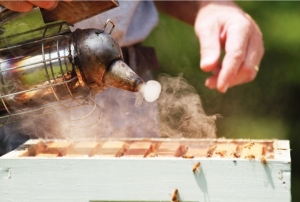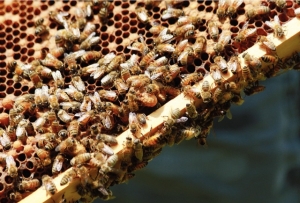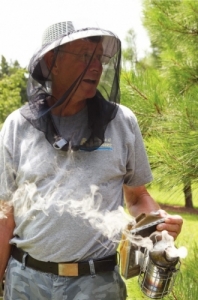Let's bee friends
By Steve Herring
Published in News on July 31, 2014 1:46 PM

News-Argus/MELISSA KEY
Bill Thering uses a smoker to care for his 82 honeybee hives at his home in Pikeville on Wednesday afternoon. Thering has been a beekeeper for 10 years and now teaches bee school classes.

News-Argus/MELISSA KEY
The Beekeepers of the Neuse has surpassed 100 members as more people have realized the importance of the pollinators.
It's better to float like a butterfly than to be stung by a bee.
To prove that simple lesson, Bill Thering, wearing no protective gear and armed with only a smoker, makes calm and measured movements among his beehives -- lifting the tops and pulling out the interior honeycomb frames still covered by milling bees.
Others buzz around, one landing on his arm.
Thering calmly picks it off.
He even reaches down to pick up a male bee -- they do not have stingers.
Thering is president of the Beekeepers of the Neuse, which has enjoyed a surge in popularity in the past few years as more people have become interested in beekeeping.
He said bees live in darkness and depend on their sense of smell and also react to vibrations to respond to threats. The smoke robs them of their sense of smell, leaving them to rely on their sight. As long as you move slowly, you are in no danger of being stung, he said.
Bees are not naturally aggressive and know that once they sting, they die, so stinging is a last resort, he said.
Normally when people find out Thering is a beekeeper the first question they ask is if he has been stung.
Yes.
The second is does it hurt?
Yes.
The most painful was when a bee flew up his nose and stung him.
"I don't care who you are, that will make you get on your knees and cry," he said. "That hurt. Every beekeeper is going to get stung at one time or another."
Formed just two-and-a-half years ago, the Beekeepers of the Neuse last month passed the 100 membership mark and is growing rapidly, Thering said.
The nonprofit group meets on the second Monday of the month at 7 p.m. at the Extension Service office. Dues are $25 and include membership in the North Carolina State Beekeepers Association.
Meetings normally last less than an hour, but members tend to linger for an hour past that to socialize and trade stories.
Anyone interested in beekeeping is welcome.
The organization is all about education, Thering said, and sells locally produced honey to help raise funds.
On Aug. 16 from 9 a.m. to 3 p.m., the group will host the second annual National Honey Bee Celebration at Old Waynesborough Park.
"The focus is always education -- how much we can bring to everybody who is out there," Thering said. "We try to bring equipment out there, we try to get beekeepers that have gone through our bee school there. But it is mostly hands on.
"A lot of people, if there is an open hive, they won't go anywhere near it. So a little interaction can do a lot and that is what Bee Day is about -- so people recognize pollinators for what they are worth, that we have to have the bees."
For people interested in becoming a beekeeper there is even a bee school.
The local bee school started about five years ago. There were 14 people at the first class held at Wayne Community College. Last year there were 62 at the Extension Service office.
The Extension Service provides invaluable support, he said.
It would be "tough" without their help, Thering said.
"My bottom line on bee school, and I have been teaching them for years, is I want a student that isn't going to kill the bees when he goes home," Thering said. "That is step No. 1 in teaching somebody how to be a beekeeper -- how to keep them alive and how to help them thrive.
"After that, it is all hands-on education, but the biggest challenge is keeping the bees alive that first year. We try to teach people how to do it so their bees don't die."
Thering, who comes from a farming background, became a beekeeper 10 years ago, after retiring as owner of Griffin Steel.
"We always had bees in the area," he said. "So it has always been in the back of your head, 'Boy it would be nice to have bees. I can't keep cows out here so why not have bees?'
"It is kind of like an infectious disease, you get it and then it gets worse. Then it gets a lot worse."
Thering started with two hives that first year, building up to 12 by year's end.
But because he lacked the proper education he was back down to two the following year -- the hives wiped out by a disease he didn't know about.
"That is what we want to keep new beekeepers away from," he said.
His lessons learned, and after attending bee school, his hives grew to 82, requiring him to spend up to 30 hours a week working with them.
"I retired," he said. "I didn't want another job. Consequently, we are currently cutting back. I am selling hives off. We have sold about 22 this year, but we have to get down to something manageable.
"You know who will be a beekeeper and how long they will be a beekeeper pretty much the first time they see eggs inside of a new hive. It's that unknown in there that keeps you interested because you want to see if they can do better. You want to fix the problems they have. It is the constant quest on the unknown side. It is a new learning curve every day."
People will know within first month if the hive is going to live, he said. They will know within the first year how they are going to do as a beekeeper.
"If you really want to be a beekeeper, your bees will die and you will want to replace them," he said. "You will have about $500 tied up in getting it set up. That is about the cost to get set up."
If the hives fail because of something the beekeeper did, about 30 percent of the people in the local bee school quit. The other 70 percent plan for the next year, he said.
"Those are the ones you know are going to be good beekeepers," he said.
For more information about the Beekeepers of the Neuse, call Thering at 919-735-1983 or Extension agent Jessica Strickland at 919-731-1525.

